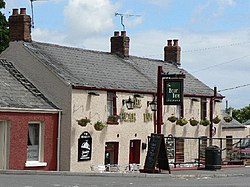Llanharry
Llanharry
|
|
|---|---|
 |
|
| Llanharry shown within Rhondda Cynon Taf | |
| Population | 3,643 (20`1) |
| OS grid reference | ST005805 |
| Principal area | |
| Ceremonial county | |
| Country | Wales |
| Sovereign state | United Kingdom |
| Post town | Pontyclun |
| Postcode district | CF72 |
| Dialling code | 01443 |
| Police | South Wales |
| Fire | South Wales |
| Ambulance | Welsh |
| EU Parliament | Wales |
| UK Parliament | |
| Welsh Assembly | |
Llanharry (Welsh: Llanhari) is a small village in the county borough of Rhondda Cynon Taf, Wales.
Historically Llanharry has been inextricably linked with iron mining as far back as the Roman period, and for a period in the 20th century it boasted the only iron mine in Wales.
Llanharry iron mine worked from the early 1900s but closed in 1976; its main ore was goethite, which was used at the local ironworks.
Since the closure of its mines and ironworks, Llanharry has been in economic decline, but this is has occurred across most South Wales Valleys villages once dependent on heavy industry. Llanharry's proximity to the M4 motorway in Wales has allowed its residents opportunities to commute to work more easily rather than seeking work locally.
Llanharry contains a few small local amenities, such as a corner shop and a hairdressers.
Llanharry is home to Llanharry Primary School, built 1935 and Ysgol Gyfun Llanhari Welsh medium secondary school which was built in 1974. In 2012 the secondary school became Rhondda Cynon Taf's first 3-19 school, opening a new Welsh language primary department in the former sixth form block.
Buses are the main transportation links servicing Llanharry. Between 1871 and 1951, the village was served by Llanharry railway station, but there is no longer any local rail connection. The nearest station is now Pontyclun. The M4 motorway skirts the southern end of the village, but there is no direct local access to it.
At the centre of Llanharry is Saint Illtud's Church which was built in 1867.
...
Wikipedia

